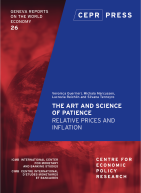Geneva Reports on the World Economy
Geneva 10: Are the Golden Years of Central Banking Over? The Crisis and the Challenges
The two decades to 2007 were in many respects a golden age for central banking. In the early 1980s, armed with independence and mandates that allowed a focus on inflation as the primary goal for monetary policy, central banks created a framework that allowed them to successfully translate the political goal of price stability into strong growth and low and stable inflation.
But in just over a few months, the world switched from enjoying highly favourable macroeconomic and financial market conditions to experiencing extreme financial turbulence and global recession. By the autumn of 2008 and with the collapse of key markets and the disintegration of institutions such as Lehman Brothers and AIG, concerns with systemic stability were paramount.
The tenth Geneva Report on the World Economy looks at what policy makers did right in the golden years, what structural changes in the economy and financial system they might have overlooked, and the challenges they face in the aftermath of the financial crisis.
The Report identifies key areas where the existing framework for macro-financial policies needs to be improved:
� the conduct of financial supervision and regulation;
� the relationship between price and financial stability and, in particular, how monetary policy should take financial factors into account;
� the weakening of the monetary transmission mechanism in periods of stress; and
� the need for monetary policy to maintain its commitment to price stability.


